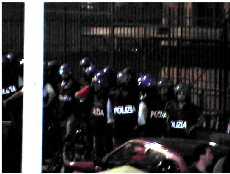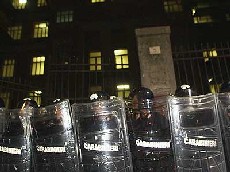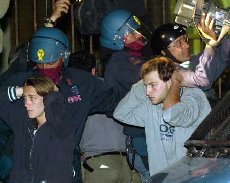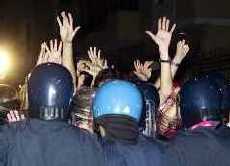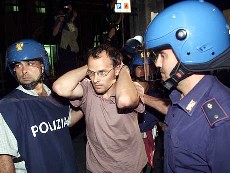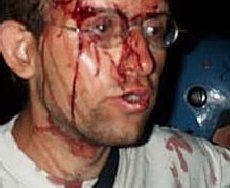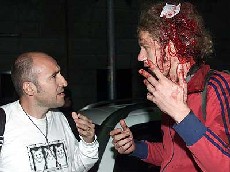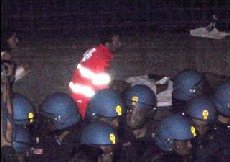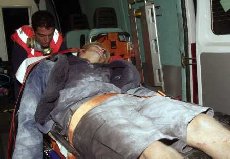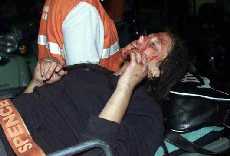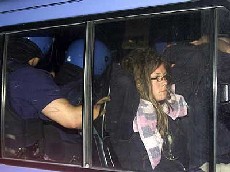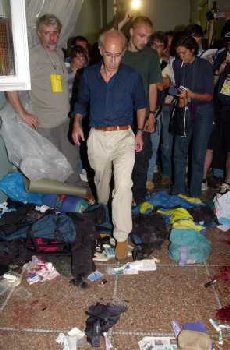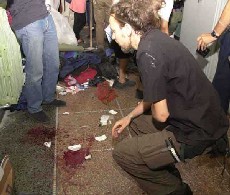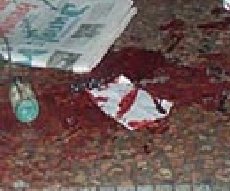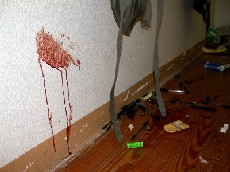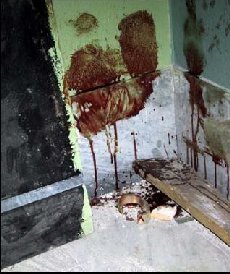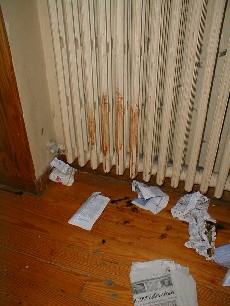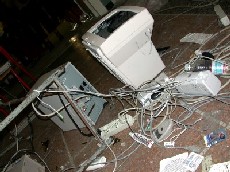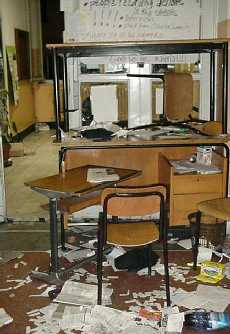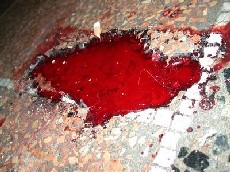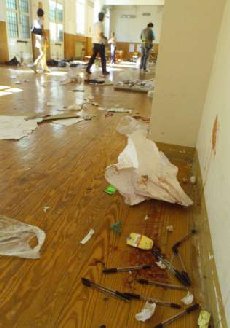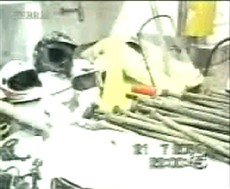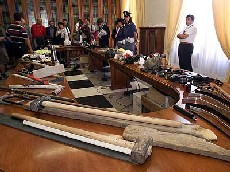|
after the raid...
the "weapons" found in the school...
|
21./22.7.: Raid on Diaz school
brutal raid on Diaz school: report and update
PLEASE SPREAD WIDELY!!!
report by starhawk
about the raid from de.indymedia.org
570 people are still in hospital and more than 100 still imprisoned after the G8 protests in Genoa. One man from Lithuania has been charged with alleged attempted homicide of a policeman. They are in the prisons of Alessandria, Pavia, Vercelli, Voghera and Genova.
On Monday, another 38 people were arrested in and around Genoa and at the borders. It is danerous to be in Genoa right now. The police are searching for foreigners in bars and restaurants. Some have been released again. Others may receive charges for looting and devastation.
Report from the raid at the Diaz School in Genua Saturday night/ Sunday morning, July 21st/22nd
On Saturday, 21st of July at midnight a special force of Carabinieri raided the Diaz school in via Cesare Battisti in Genua, where people taking part in the demonstraton against G8 were sleeping.
Police acted with extraordinary brutality.
At 11.56 pm about 200 policemen came running into the building, opening the gate violently and destroying a side door.
All of the people inside the building have been beaten up, most of them so hard that they had to be carried out on stretchers into an ambulance. Just a few people where still able to walk. Those were brought to police stations. During that action, which lasted about two hours, people outside the building could hear screams of pain from the inside. Additionally a helicopter was just a few meters above the builing all the time, looking for people trying to escape.
When the police raid was finished and journalists from the building opposite were allowed to enter the school, they found a lot of the things inside the school destroyed, peoples' belongins spread everywhere on the floor and blood everywhere on the floors, the staircases and walls.
Later on hospitals where the injured have been brought reported that some of them have been beaten up so heavily that they may not survive.
A nurse from San Martino hospital said some of the injured where in an incredible condition beyond imagination:
complicated multiple fractions, smashed craniums, crushed teeth. She said she never saw something like this before, and that most of those who were still conscious were under shock, extremely pale and hardly responded. They were afraid of being touched in any way. (Some of them are only 20 years old).
There still is no information about all the arrested people. Lawyers have not been allowed to contact the people.
93 people are said to be arrested during the police operation at Diaz school.
15 Italians have been set free. The other 78 people from different countries are still in prison or in hospital, but neither the hospitals nor the police are giving any infomation except to relatives, but even a sister was not allowed to see her severely injured brother on monday (23d of july).
A delegation consisting of a member of the European Parliament, Luigi Vinci (Rifondazione Communista party), a member from a social centre in Milan and a translator from Germany visited the womens jail in Vercelli on Monday 23rd.
This is the translator's report:
Of the arrested women from the school, six are in the prison of Vercelli, it was possible to speak with four of them:
The following short assessment was made after a 5minute talk with them.
- One Swiss woman seemed relatively calm, had visible wounds in her face
- Another Swiss woman also seemed relatively calm.
- A woman from Germany had three stitched wounds in her head, according to her she was "treated better than others".
- The condition of another woman from Germany seems to be okay.
- It was not possible to speak to a woman from Italy and a woman from Sweden.
All woman said they were beaten in the school. They also said that the condition of the men from the Diaz School was certainly much worse. They report that the men were contniuously tortured all through the night at the police station, because they heard screams from them all night. The women themselves were continously harassed at the police station: they were insulted, beaten and kicked on their way to the toilet. They all say that they got through this relatively well. At the prison the treatment is better than at the police station. Some of them were allowed to make phone calls. They are in 2-3 cells mostly sorted by nationality.
Nearly all women are charged with public resistance. At least one man, whose identity is not known to the police, is to receive a charge of attempted homicide.
There may have been X-rays stolen from the hospital.
The translator also met Italians who had already been arrested on Saturday afternoon. They were released from Vercelli yesterday. They report the following:
- They were not beaten at the police station in Genoa. However they had to stand with their hands up against the wall without anything to eat or drink for 19 hours. They said that the policemen were evidently organised fascists.
- There were permanent insults like "shitty jewish gipsy", "hasta la victoria siempre" combined with a nazi salute, and Mussolini portraits were seen on the walls.
- A person whose legs were broken previously could not stand up against the wall and was continously beaten until she stood up against the wall somehow.
- The policewomen were sometimes worse than the men. They pulled women by their hair and ripped hair. The imprisoned women described them as "total psychopaths".
- Furthermore they reported that tear gas was thrown into the cells. One person then vomitted blood.
All imprisoned call for help and to enforce pressure somehow!!!!
The translator's report ends here.
The prisoners have been detained in prison for 60 hours (as of Tuesday, July 24th, 12 o'clock).
***
Fascism in Genoa
by Starhawk
I was there when the carabinieri raided the IndyMedia Center and the Diaz school, in Genoa, at the end of the protest against the G8 meeting. We heard the shouts and screams, couldn't get out the door, ran upstairs and hid, fearing for our lives. Eventually the cops found us, but we were the lucky ones. A Member of Parliament was in our building; lawyers and media arrived. There was some obscure Italian legal reason why the police could be deterred. They withdrew.
But nothing could save our friends across the street, at the school where people were sleeping and where another section of the Independent Media were located. The police entered: the media and the politicians were kept out. And they beat people. They beat people who had been sleeping, who held up their hands in a gesture of innocence and cried out, "Pacifisti! Pacifisti!" They beat the men and the women. They broke bones, smashed teeth, shattered skulls. They left blood on the walls, on the windows, a pool of it in every spot where people had been sleeping. When they had finished their work, they brought in the ambulances. All night long we watched from across the street as the stretchers were carried out, as people were taken to the jail ward of the hospital, or simply to jail. And in the jail, many of them were tortured again, in rooms with pictures of Mussolini on the wall.
This really happened. Not back in the nineteen thirties, but on the night of July 21 and the morning of July 22, 2001. Not in some third world country, but in Italy: prosperous, civilized, sunny Italy. And most of the victims are still in the hospital or in jail, as I write this four days later.
I can't adequately describe the shock and the horror of that night. But as terrifying as it was to live through it, what is more frightening still are its implications:
- That the police could carry out such a brutal act openly, in the face of lawyers, politicians and the media means that they do not expect to be held accountable for their actions. Which means that they had support from higher up, from more powerful politicians. According to a report published in La Repubblica from a policeman who took part in the raid, when the more democratic factions within the police complained that the Constitution was being violated, they were told, "We don't have anything to be worried about, we're covered."
- That those politicians also do not expect to be condemned or driven from office means that they too have support from higher up, ultimately, from Berlusconi, Italy's Prime Minister, himself.
- That they could beat, torture, and falsely arrest Italians means that they do not expect to be held accountable by their own people.
- That they could beat, torture and imprison internationals shows that they do not expect to be held accountable by the international community. And indeed, who is going to hold them accountable? George Bush, the unelected, unmandated heir of a coup? Sweden, which just used live ammunition on protestors? Canada, builders of the Wall of Shame?
- That Berlusconi could support such acts means that he must be certain of support from other international powers, and that these overtly fascist actions are linked to the growing international escalation of repression against protestors.
- That the Italian government used tactics learned from Quebec: the wall, the massive use of tear gas, and that the RCMP had observers in Genoa in preparation for next year's meeting in Calgary, means that police repression is also a global network. As we learn from each action, so do they.
- That the Italian government are now targeting the organizers of the Genoa Social Forum shows where their agenda was heading all along: the discrediting of the antiglobalization network, the discouraging of peaceful and legal protest as well as direct action. The leader of the Forum has lost his job. Others are fearing for their freedom and safety.
It's hard to make sense of all that happened in Genoa. So much happened so fast, and in the middle of it it was hard to know what was going on. The Black Bloc suddenly appear in the midst of a square that is supposed to be a safe space for peaceful gatherings: the police gas and beat the women and the pacifists and let the Bloc escape. We are having a quiet lunch in the convergence center by the sea, when suddenly tear gas cannisters are flying into the eating area and a pitched battle begins directly outside, not a hundred yards away from the main march. Prisoners report being tortured until they agree to shout "Viva il Duce!" The police rationale for the attack on the school was the supposed presence of members of the Black Bloc-but they never attacked the actual Black Bloc encampment, and by the night of the attack most of the Black Bloc had left the city.
I'm not an investigative reporter-I'm an activist and once upon a time when life was not so overwhelming I was a novelist. I don't like conspiracy theories but I make sense of the world through stories. Genoa makes sense to me if this is the plot:
"Memo: Italian Security to Italian Government/U.S. and International Advisors:
"Subject: Covert Security Plan for Genova
"Top Secret!
"The overt Security Plan for the Genova G8 meeting has been covered in a separate memo. The subject of this memo is the covert plan.
"Phase One: Lead up to the action: This phase is characterized by two major aspects: the creation of a climate of fear and anticipated violence by the stockpiling of body bags, deployment of missiles, etc. And second, a concerted effort to undermine the popularity of the stronger, radical groups such as the 'Tute Bianca' or White Overalls through smear campaigns, accusations that they cooperate with the police etc. If necessary, we will plant actual bombs to increase the climate of fear.
"Phase Two: Recruitment and infiltration: We will concentrate on infiltrating the Black Bloc and strategically placing provocateurs who will be in positions to instigate attacks, violence, and destruction of private property which will turn the population against the protestors. In addition, we will encourage Fascist groups to run as segments of the Bloc which will then give us an excuse to attack the main body of protestors.
"Phase Three: Friday, 20 July. We arm the police and carabinieri with live ammunition rather than rubber or plastic bullets. With luck, deaths will result. Our 'Bloc' can appear strategically near any group we wish to attack, giving us the excuse to gas and beat the 'nonviolent' demonstrators. Protestors should be severely beaten and arrested protestors tortured to deter them from further demonstrations. In addition, our Bloc will instigate the destruction of property, particularly small shops, private cars, and will attack and beat other demonstrators, perhaps even a nun or two, further discrediting the anarchists. A high level of violence and destruction should lessen the numbers expected for Saturday's march.
"Phase Four: Saturday, 21 July. Our strategy here is directed to undermine, divide, and disperse the march. We instigate more property damage and police battles in the morning near the assembly point of the march. One of our factions will attack the Tute Bianca during the march itself. Shortly after noon, we begin a battle just outside the convergence center, near the corner where the march turns north, giving us the excuse to gas the convergence center. We attempt to drive the battle into the march, splitting or disrupting it, and providing the rationale to attack the march with tear gas and other dispersal agents.
"Phase Five: Post-march. We continue the climate of fear with a midnight raid on the main communications center and sleeping quarters of the protestors. Severe force is justified by rumors of Black bloc presence. We uncover 'evidence' of connections between the Genova Social Forum and the bloc, thereby discrediting them. Beatings, arrests and torture will discourage future involvement with protests.
"Phase Six: Sunday, 22 July and beyond: We continue harrassment and random arrests of foreigners and suspected protestors. We begin a campaign of accusations against the Genoa Social Forum, connecting them with the Black Bloc, moving against their employment, their credibility, and possibly taking legal action against them. This will also force them to disavow the Black Bloc, further splitting the movement.
This memo is fiction, but I believe it's essentially true. Like a mathematical proof, it has a simple internal consistency that makes sense of the known facts. And there is more and more mounting evidence that the 'black bloc' in Genoa was significantly composed of organized fascist groups working in collaboration with the police.
If it is true, even partly true, what does it mean to us?
It means that the response to the events in Genoa will determine what level of force can be used against future demonstrations, whether we will see smashed skulls and more deaths in Calgary, and blowtorches in the armpits in the third world.
There are signs, however, that their strategy may backfire. On Monday all over Italy 250,000 people took to the streets. The pressure is on for the Minister of the Interior to resign; Berlusconi's government is threatened. There were demonstrations at Italian embassies all over the world.
We need to keep the pressure on, to make sure the issue doesn't fade away. Keep calling and writing the embassies. Get your political organization, union, workplace or group of best friends to write and call. Ask your local news media why they are not telling this story. Now is not the moment to be ideological and purist; now is the moment to call in all our allies, set aside our differences, and act in solidarity. For if this level of repression goes unchallenged, no one is safe, not the most legal NGO, not the most reformist organization with the mildest demands. If we don't act now, when a political space remains open to us, we may lose the space to act at all.
Continue to organize and mobilize for the next one. Fear is their most powerful weapon. The fact that they must resort to fascist violence shows that we are a serious threat.
If we want to continue to be a threat, we also need to look critically at our own movement, to identify what we do that leaves us wide open to infiltration and manipulation.
And we need both better preparation and better networks of support for these actions.
The Genoa Social Forum needs support. They've sent out the following call-please answer it.
On Monday the opposition has demanded in Parliament the resignation of the Ministry of Interior and on Tuesday demonstrations in thirty Italian cities are held, with more than 250,000 people participating.
We ask your help for denouncing these threats to democracy and justice. You could act in one or more of the following ways:
- Write a short statement (or a brief article) in support of the right to protest against the G8, in solidarity with the Genoa Social Forum and the peaceful demonstrators. Please state clearly your affiliation. The texts will be published by the Left daily Il Manifesto, and by other media around the world.
- Send formal messages of support on behalf of associations, NGOs, media organisations, Universities, etc.
- Write/sign an international appeal for democracy, justice, respect of human and civil rights. If many of you are interested, we can work together on a text in the next days.
Please send your articles and messages to:
redazione@ilmanifesto.it
and to the
Genoa Social Forum
via San Luca 15/9 - 16124 Genova
tel. 010 2461749
fax 010 2461413
e.mail info(a)genoa-g8.org - webmaster(a)genoa-g8.org
***
